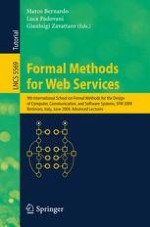2009 | Book
Formal Methods for Web Services
9th International School on Formal Methods for the Design of Computer, Communication, and Software Systems, SFM 2009, Bertinoro, Italy, June 1-6, 2009, Advanced Lectures
Editors: Marco Bernardo, Luca Padovani, Gianluigi Zavattaro
Publisher: Springer Berlin Heidelberg
Book Series : Lecture Notes in Computer Science
